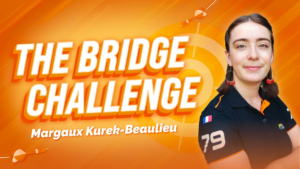
The Invincible Zia tournament analysis – July
Named ACBL player of the year many times,world champion and member of the Hall of Fame, Zia Mahmood gives you a hard time every month during Funbridge Points Tournament!
Discover 3 deals analysed by Zia Mahmood from his July tournament.

Deal 12
 |
| West | North Zia | East | South Zia |
| PASS | PASS | ||
| PASS | PASS | ||
| PASS | PASS | ||
| PASS | PASS | PASS | |
| PASS |
It’s always a thrill to bid a grand slam – and on the internet, if it doesn’t look like it will make you can always turn the computer off and not hear partner complain about your bidding.
Hands like South’s are not easy. With all the points in the long suits you can make a case for reversing into 2 ♦ after the normal 1 ♣ – 1 ♠ start to the auction, but that can go wrong if the response was in the modern style on not very much. I’ve even seen people open 1 NT on hands like this to avoid the decision whether to reverse. I’m not one of those people – singleton K or Q.
My robot partner took a conservative option, making a simple rebid of 2 ♣. I was able to offer a forcing raise to 4 ♣, and when it produced a control bid in diamonds I could envisage plenty of tricks. It wouldn’t need more than ♠ x x ♥ x x ♦ A x x ♣ A K x x x x and the grand slam would be an excellent contract.
My 4 NT was a check on key cards, and its 5 ♣ showed 0 or 3 of the four aces and ♣ K. It couldn’t really have 0 after that 4 ♦ bid, so I bid 7 ♣ and when no one doubled I knew we were in with a chance. They moved me to the South hand for the play, but they needn’t have bothered – my robot, or my dishwasher, could have made 13 tricks. This was an 83% score – maybe not everyone is as thrilled as I am by grand slams.
Deal 10
 |
| West | North Zia | East | South Zia |
| PASS | PASS | ||
| PASS | PASS | ||
| PASS | PASS | ||
| PASS | PASS | PASS |
At matchpoint scoring, it pays to declare the hand as often as possible. No one ever won a pairs tournament by defending one-level contracts on every deal, especially when the opponents seem content with the suit they have chosen.
So when West’s rebid of 1 ♠ was passed around to me I decided to compete with 1 NT. At the vulnerability this was not without risk – if East had a maximum for his pass of 1 ♠ I would be doubled, and down only one would be the dreaded minus 200 on a part score deal, usually a bottom. But East, despite four-card spade support, rather dubiously decided to go quietly and I was left in my contract.
West led a low spade to my Jack, a promising start. I tried ♦ J, covered by West’s Queen and dummy’s Ace, then ducked a club to West’s Jack. West cleared the spades, and I ducked another round of clubs – slightly disappointed to find West with three rather than with ♣ A J doubleton.
West now played a low diamond, maybe hoping to cut me off from dummy’s long clubs. But I could win that with ♦ 9 in my hand and give West his final club trick. At last he cashed his winning spades, but that was all for the defence. Plus 120 was a huge 93% score, since it beat all those who had collected 100 from contracts by East-West (or conceded 80 against the modest 1 ♠).
Deal 8
 |
| West | North Zia | East | South |
| PASS | PASS | ||
| PASS | PASS | ||
| PASS | PASS | ||
| PASS | PASS | ||
| PASS | PASS | PASS | |
| PASS |
Grand slams, as I said before, are a thrill – but we missed this one. It was all my fault as well, for not knowing the system.
My robot, with an almost balanced hand this time, decided to rebid 1 NT after the 1 ♣ – 1 ♠ start to the auction. I wasn’t sure whether I could respond 2 ♠ – maybe the robot would think that was weak.
I forced to game with an artificial 2 ♦ – this is a very useful modern convention, allowing information to be exchanged at a low level in the search for game or slam. Over the natural 2 ♥ by the robot I jumped to 3 ♠ – since 2 ♠ would be forcing I wanted to convey the special message that my spades were solid and that I was looking for slam, not game.
That was enough for the robot, who took charge with 4 NT. I dutifully showed three key cards (four aces and ♠ K) and partner bid 6 ♠. Well, I had plenty of extra values, but when partner bids Blackwood and then chooses a contract you must respect that choice – for all you know there could be an Ace missing. I did remember to convert to 6 NT because of the matchpoint scoring.
Much good it did me, for when I moved to the South seat for the play I was depressed to find that it was not going to present much of a challenge. Missing the grand was worth a mere 37%, and I had only myself to blame. Apparently my 2 ♦ rebid was limited to 18 points, so I couldn’t crime the robot for not trying for the grand with only 14 of its own. Next time, though, I’m just going to bid seven and hope (or maybe even read the system). Still, playing with a robot means never having to say you’re sorry.



